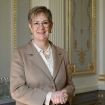By James Chalmers
Trust in non-financial reporting: The role of assurance
As investors increasingly look to ESG information to inform capital allocation decisions, and regulators seek to ensure ESG reporting is accurate, consistent, comparable, relevant and transparent, companies now have the opportunity to share more information about their impact on the world than ever before.
Today, with the United Nations COP26 climate change conference in full swing, and globally aligned non-financial reporting standards on the horizon through the establishment of the ISSB, I can’t help but think about the critical role that assurance plays in building trust in ESG reporting.
Assuming that some companies may be under pressure to paint a positive picture about their performance, a key question for their stakeholders is, ‘Can I trust this information?’ The answer to that question is essential on matters of critical importance, like employee health and safety, compliance with the law, managing and making investments, addressing climate change, and ensuring reliable company financials, to name just a few. Assurance over that information is intended to form an opinion on whether the information presented represents what it says that it represents, including whether it is in line with a particular reporting framework.
Trust is always a matter top of mind at PwC and one on which I have written in the past. So it wasn’t surprising to me that in PwC’s September 2021 survey of 325 investors globally, nearly 80% said they trust reported ESG information more when it’s been assured. And 70% said that companies should be required to obtain assurance on all material ESG information, not simply on a subset that the company chooses. Bluntly, it’s been reported widely in the media that some companies report only on what they want to share, in part because of the ‘alphabet soup’ of non-financial reporting standards to choose from. Investors are clearly telling us they see the existing reporting-landscape, and absence of widespread assurance, creating the potential for greenwashing and cherry picking.
It is clear the rules and incentives that drive the economy – and shape corporate activity – need to better reflect the biggest challenges facing society, like ESG. My colleague Nadja Picard recently wrote about crucial decisions around what organisations should disclose, and our investor survey confirms that investors are looking for better reporting on the detailed plans behind companies’ commitments to address environmental and social issues. Three-quarters of investors said it is important that ESG-related metrics are assured, with nearly the same amount saying they want this to be assured at the same level as financial reporting – to me, that says that the need for trust is strong.
I’ve seen first hand the value an independent external auditor (or assurer) brings to the reporting process. Although financial reporting is a mature process in most companies, assurance isn’t a guarantee of infallibility. But assurance gives stakeholders a reason to trust the data they see. The role of the assurer is to form an opinion on the judgments made by companies – that they are reasonable, objective, and in line with a particular reporting framework. The benefits of external assurance apply to disclosures beyond financial reporting – and are just as important for the complex and heterogeneous types of data included in ESG disclosures. The more that ESG reporting is integrated into the decision-making processes of companies, boards and investors, the more important it is that the information is trustworthy.
But for assurance to provide the trust that stakeholders need, it must be guided by a focus on quality. Quality requires three things:
Assurers need to be trained in providing assurance. While it sounds simple, to provide an objective opinion on the reliability of information reported, an assurer needs access to the relevant detailed methodologies, processes and procedures, and have the necessary quality management tools in place. They need an understanding of the assurance standards being applied, and know where the biggest judgement areas are – both for them and for the company. Having a culture of challenge, and being trained in applying professional skepticism (some refer to this as the ‘auditor’s nose’) are critical to appropriately applying these tools.
Assurers need technical knowledge of what is being assured – whether that is financial information, greenhouse gas emissions, gender pay gaps or governance structures. Expertise in the subject, or access to independent subject matter experts with that knowledge, is necessary for identifying, assessing and responding to the relevant risks, including validating data sets, assessing their accuracy and ensuring that nothing material has been omitted, as I’ve talked about previously. This includes having detailed knowledge of the reporting standards being applied so that the user can get comfort that a disclosure meets the specific criteria it claims to meet.
And assurers need to do all this in the context of a regulated professional ethical framework that reinforces assurer independence, integrity and objectivity.
Providing assurance is an objective process underpinned by judgement and expertise developed from experience and education. This begins and ends with the skill of the assurer and a healthy dose of skepticism, context, analytical mindset and a deep bench of seasoned specialists evaluating the information.
Of course, the role of auditors in financial reporting has developed over many years. But, the world is moving on quickly and changes are coming at us faster – company reporting must also evolve just as quickly. As my colleague Henry Daubeney has said, standard setters should collaborate to create a framework companies can report against as high quality reporting and assurance go hand-in-hand in building trust.
As reporting moves forward, I am excited to be able to take what we know about auditing financial statements and bring it to ESG reporting. Now is the time to build trust and sustained outcomes in areas of critical importance to business, capital markets and society. We are learning, evolving, and ready to take on this challenge. Let me know what you think – send me a message.
Contact us















